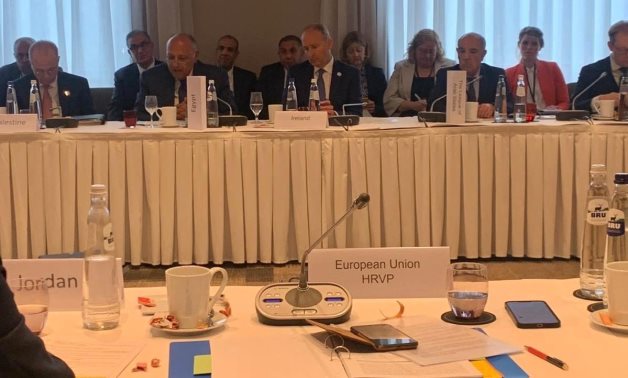EU foreign ministers are meeting with their six Arab counterparts to discuss efforts on ending the Israel-Hamas war in Gaza.
Bloc’s top officials are due to hold talks with their counterparts from Saudi Arabia, Egypt, Jordan, Qatar, UAE, and Egypt. Sven Koopmans, EU Special Representative for the Middle East Peace Process, stated:
[The talks] happen at a crucial moment in the war, when the situation in Gaza is ever more disastrous, international pressure to end the fighting reached a new high.
So far, international attempts to agree on plans for Gaza after the war have stalled, according to Euractiv. Peace efforts also included several rounds of Egyptian-brokered Israel-Hamas ceasefire talks and peace plans for the future states. As a result, the EU recently presented a plan to relaunch efforts on the Middle East peace process.
“We need to prepare for a post-ceasefire situation and for credible steps to implement the two-state solution. It is vital that we come together to increase our cooperation for peace and massively increased humanitarian aid flow; we need to work together on supporting the Palestinian Authority and on our messages to Israel and Hamas.”
The EU’s chief diplomat Josep Borrell stated on Sunday that “the two-state solution is not a painful concession that Israel is doing.”
On the contrary, it is the only long-term guarantee for the security and prosperity of Israel. I know that the current Israeli government is not convinced of that, and we have to work in order to make this idea go through to the public opinion, in order to push for the only solution that we can imagine, in order to bring peace and security to the two people who are fighting for the same land.
Israel-Hamas war outcomes
The talks came after two EU members, Ireland and Spain, as well as Norway, announced last week that they would recognise the State of Palestine from Tuesday. In response, Israel threatened to recall its envoys to those countries.
Borrel stated before meeting Palestinian Prime Minister Mohammed Mustafa for talks on Sunday that “a functional Palestinian Authority is in Israel’s interest too because in order to make peace, we need a strong Palestinian Authority, not a weaker one.” For his part, Mustafa, speaking alongside Spanish Foreign Minister José Manuel Albares in Brussels, said:
We obviously are grateful and very pleased to have three European countries to join 143 other countries in this recognition, but we obviously want to have every country in Europe do the same.
Mustafa stressed that recognition was vital to sustaining the peace process in the Middle East amid the ongoing Israel-Hamas war. He also outlined Palestine’s three key priorities to international partners. Those included restoring basic needs and services, building state institutions, and stabilising the financial situation.
In addition to meetings with their Arab counterparts, EU foreign ministers are also likely to discuss what further role the bloc can play in Gaza. According to several EU diplomats, the United States proposed to Brussels to reopen its European Union Border Assistance Mission (EUBAM) Rafah to monitor the crossing point for humanitarian aid from Egypt.
EU foreign ministers on Monday are expected to potentially come up with “some kind of operative conclusions that could allow the mission to deploy.”
